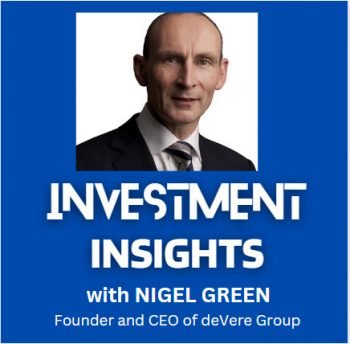 Russia is hosting the latest BRICS summit in a strategic demonstration of strength and unity as it seeks to challenge the geopolitical dominance of the West.
Russia is hosting the latest BRICS summit in a strategic demonstration of strength and unity as it seeks to challenge the geopolitical dominance of the West.
The BRICS group – comprising Brazil, Russia, India, China, and South Africa -has evolved beyond its original purpose as a coalition of rapidly developing economies.
Initially founded to represent economic growth prospects, BRICS has since transformed into a powerful geopolitical forum, making it more relevant for global investors looking to understand emerging markets.
This relevance has only increased with the expansion of BRICS in 2024 to include Egypt, Ethiopia, Iran, and the United Arab Emirates.
For investors seeking fresh opportunities, this expanded membership is a signal of important developments on the horizon.
The expanded BRICS group brings together a diverse set of countries, each contributing unique strengths to the bloc.
Egypt and Ethiopia are significant players on the African continent, offering access to growing consumer markets and abundant natural resources. Iran, with its rich reserves of oil and gas, adds critical weight to the bloc’s energy capacity, while the UAE’s inclusion enhances BRICS’ reach into global finance and trade logistics due to its pivotal position in the Middle East.
These new members strengthen the bloc’s position in international economic discussions, and with the inclusion of such diverse economies, BRICS now represents a greater share of global trade, natural resources, and financial flows.
For global investors, this new alignment within BRICS presents a wide range of opportunities.
With its membership now covering key areas of Africa, the Middle East, and Asia, the bloc’s influence is growing in regions where traditional Western powers have not always held sway.
The Global South is becoming increasingly attractive for investors seeking to diversify portfolios, particularly as growth in developed markets stagnates.
The expansion of BRICS highlights a new trend where countries in the Global South seek stronger ties and collective bargaining power in global markets. To my mind, investors who recognize this shift will find the BRICS countries to be critical players in reshaping the global economic order.
One of the key factors driving this development is the bloc’s collective resistance to Western economic hegemony.
Many BRICS nations have been outspoken critics of the dominance exerted by institutions such as the International Monetary Fund (IMF) and the World Bank, both of which are largely influenced by Western countries.
This has fuelled a growing desire among BRICS members to create alternative institutions and frameworks that better reflect their interests. The New Development Bank (NDB), set up by BRICS to finance infrastructure projects across emerging markets, is just one example of this ambition. With expanded membership, the NDB’s role as a source of capital for developing economies is likely to increase, offering investors the chance to participate in large-scale infrastructure and development projects that may yield significant returns.
Additionally, the presence of countries like the UAE and Iran within BRICS highlights the bloc’s growing influence in energy markets.
Both countries are crucial players in the global energy landscape, with Iran holding vast oil reserves and the UAE being a critical hub for the flow of oil, gas, and refined products.
As the global energy transition progresses, investors who are looking for exposure to both conventional and renewable energy sources may find unique opportunities in the BRICS nations. These countries are likely to play a pivotal role in shaping future energy strategies, both as producers of traditional fossil fuels and as adopters of renewable energy technologies, driven by investments in green infrastructure.
In terms of trade, the BRICS expansion also signals increasing economic integration across key regions of the world.
By including members from Africa and the Middle East, the bloc now controls critical trade routes, including maritime corridors that are essential for global shipping.
The UAE’s ports and logistics capabilities enhance BRICS’ ability to influence global trade patterns, particularly as economic centres shift eastward.
This growing influence makes the bloc an attractive destination for foreign direct investment, particularly in industries such as logistics, technology, and manufacturing. Investors looking to tap into fast-growing consumer markets and industries will find that the expanded BRICS economies offer new avenues for growth.
In addition, the inclusion of Egypt and Ethiopia presents significant investment potential in sectors like agriculture, infrastructure, and telecommunications.
Africa, as a whole, is one of the fastest-growing regions in terms of population and consumption, and its integration into the BRICS economic framework signals stronger ties and more coordinated development strategies.
These countries, often seen as frontier markets, are rapidly becoming integral to global supply chains. Investors with an eye toward long-term growth should consider the strategic importance of Africa’s emerging markets, particularly in sectors tied to urbanization, technology adoption, and resource extraction.
As the BRICS bloc continues to expand its influence, it is becoming increasingly clear that this group represents more than just a coalition of developing nations.
It is now a formidable force that’s shaping new norms and frameworks in the global economy.
For investors, the rise of BRICS and its latest expansion should be viewed as a critical shift in the international order, where emerging markets will play an even greater role in determining the future of global trade, finance, and investment.
Nigel Green is deVere CEO and Founder
Also published on Medium.
Notice an issue?
Arabian Post strives to deliver the most accurate and reliable information to its readers. If you believe you have identified an error or inconsistency in this article, please don’t hesitate to contact our editorial team at editor[at]thearabianpost[dot]com. We are committed to promptly addressing any concerns and ensuring the highest level of journalistic integrity.




